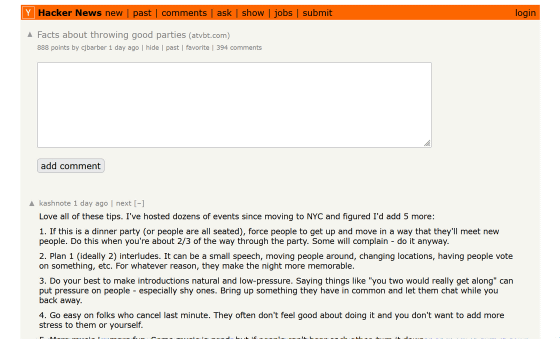21 tips for hosting a fun party

In Japan, the word 'party' is often thought of as an event held only a few times a year on special occasions, but in America, parties are considered important as a way to build relationships and socialize. Atoms vs Bits, a blog covering a variety of topics from technology to science fiction, has shared 21 tips and facts for throwing a great party.
21 Facts About Throwing Good Parties

1. Prioritize your own well-being
The enjoyment and quality of a party is largely dependent on the host's mental state, and a party hosted by a stressed host is less enjoyable. Atoms vs Bits explains, 'It's better to receive a mediocre pizza from a happy host than a fancy hors d'oeuvres from a tired host.'
2: Announce the start time 15 minutes earlier
Even if you tell people the exact start time of your party, you should assume that some of your guests will be late, so the actual start time will be different. Therefore, Atoms vs Bits advised that if you want to start your party at 2:00 PM, it would be better to say that the start time is 1:45 PM.
3. Invite a close friend to come over early
When hosting a party, you may feel anxious as the time approaches, wondering if the people you invited will actually show up, or if no one will show up at all. You can alleviate these worries by asking a close friend to arrive 30 to 60 minutes before the party to help with the preparations and have a snack.
4. Guests prefer parties with people they know
Unless you're extremely proactive and curious, most people don't want to attend a party where they barely know anyone. Generally, people attend parties where they know three or more people.

5. Share the guest list with your guests
Party apps like
6: Invite people you know together
Sending invitations to a chat group of 4-5 people or a mailing list lets your guests know that their friends are also attending.
7. Tell them you have a mutual friend coming over
Even if you have to send individual invitations, sharing the names of other mutual friends you've invited or friends who have already confirmed they'll be more likely to decide to attend.
8. Follow your instincts and bring your friends closer together
In a small group, the quality of the experience depends on how well different friends fit together. Just like when cooking, some ingredients may be great individually but not pair well together, but Atoms vs Bits advises following your instincts.
9. Avoid people who are likely to ruin the party
Large parties are like a 'jack-of-all-trades' soup, so it's important not to invite people who will ruin the experience for others.

10: Don't be afraid to decide not to invite people
In any case, if you feel that inviting this person will prevent other people from enjoying the party, you should not be afraid to decide not to invite that person and accept being a 'gatekeeper.' Even if someone is nice to associate with personally, there are cases where they are not suitable for a party setting, so you should not assume that a person's importance is determined solely by the fact that you 'don't invite them to a party.'
11. Maintain a balanced gender ratio
Whether it's a party or other event, the more balanced the gender ratio, the better, so it's important to pay attention to the gender ratio when inviting guests. If the gender ratio exceeds 70%, guests of the underrepresented gender will be less likely to accept subsequent invitations, which could lead to an increasingly skewed gender ratio. Atoms vs Bits recommends keeping the gender ratio at least 60:40.
12: Co-host an event with people who don't share your social circle
By co-hosting a party with someone you're personally close with but whose social circle doesn't overlap, you can create an opportunity for two different groups of friends to interact.
13: Understand your cancellation rate
Even if someone says 'I'll attend' on the invitation, there will always be people who cancel at the last minute. Therefore, when hosting a party, it's a good idea to understand the cancellation rate among your circle of friends and take that into account when deciding how many people to invite.

14. Couples are more likely to cancel together
If you invite a couple or a married couple, it is rare for one of them to cancel on the day and the other to attend, and there is a high probability that both will cancel together. This can cause a large fluctuation in the number of guests invited, so it is risky to invite only couples to a small party.
15: Ensure proper circulation within the venue
At parties with a large number of people, it's important to keep the flow of people as clear as possible. Since the flow of people standing is wider than when they're sitting, it's recommended to increase the number of people standing by providing tall tables for standing, moving chairs around the tables, and clearing the counter so that plates and drinks can be placed easily.
16: Spread out food and drink areas
Having food and drinks in different locations gives partygoers an excuse to move around the room, which gives them an opportunity to say hello and talk to people they might not normally interact with.
17: Assign participants who don't know anyone to a group
If a guest arrives without knowing anyone, you, as the host, should first welcome them and assign them a group to join and someone to talk to. Ideally, the person should be someone they seem to get along with, but the next best thing is someone who is friendly and easy to talk to, and if that's difficult, a nearby friendly group is fine too. The important thing is to use your host authority to do that for the guest, rather than putting the burden on them to 'muster up the courage to call out to a group and ask to be included in the conversation.'

18. Don't let anyone notice you leaving the conversation
If you're hosting a party, you can't talk to one group for the entire time, so when you leave a group conversation, you should slowly take a step back and subtly distance yourself so that your absence isn't noticed.
19: Make entertaining your guests a priority
During the party, you should prioritize introducing guests to each other and welcoming shy people, even if it means spending less time talking with close friends. Atoms vs Bits states, 'Parties are a public service. In return, guests will invite you to their parties.'
20. Parties are a public service
Atoms vs Bits repeatedly emphasizes that parties are a form of public service. Your party could lead to a new friendship or relationship, help a wonderful person feel less lonely, or bring a new child into the world. Hosting a party is a huge benefit to the community, and you should truly celebrate yourself for doing so.
21. Be mindful of the volume
A common problem with many parties is that the volume can get uncontrollably loud when there are a lot of people. Atoms vs Bits said, 'If you know of a way to solve this problem, please let me know.'

These tips have also been trending on the social news site Hacker News.
Facts about throwing good parties | Hacker News
https://news.ycombinator.com/item?id=45794032

'I think it's a very American cultural thing that parties and dinner parties are usually the responsibility of the host,' one user commented. 'In Brazil, when you're throwing a party with people you like, everyone pitches in and shares the burden. Everyone has some responsibility and everything is run informally, there are no formal rules.'
A user who has hosted many parties herself offered her own advice, such as 'Ask your friends to invite more friends,' 'Add plants or rugs to soundproof the room,' and 'It's okay to ask people to bring their own food and drinks.'
Other users offered additional advice, such as 'turning the air conditioning down significantly once the party starts,' 'heating up frozen finger foods and handing them out around the party,' 'leaving cheap disposable cameras around the venue,' 'having someone to mark their own cup with a pen or label,' and ' asking people who brought wine or liqueurs to share with other attendees.'
A user who has hosted dozens of parties in New York offered the following advice: 'Even if everyone is seated at a party, you should have everyone stand up and move around towards the end so they can talk to new people,' 'You should liven things up by having one or two small events, such as speeches, moving locations, or voting,' and 'You should be kind to people who cancel at the last minute, as they may have had their reasons for doing so.'
Related Posts:
in Note, Posted by log1h_ik







